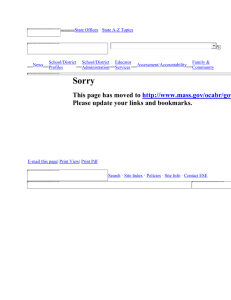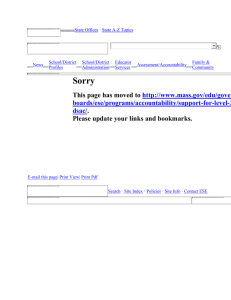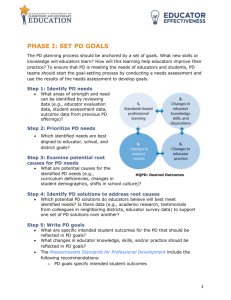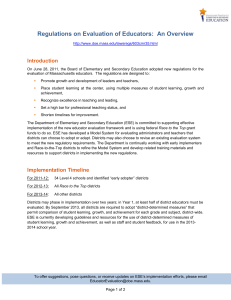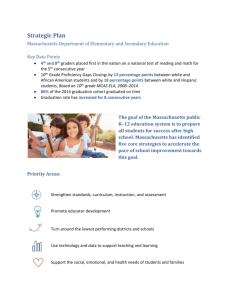2014 12
advertisement
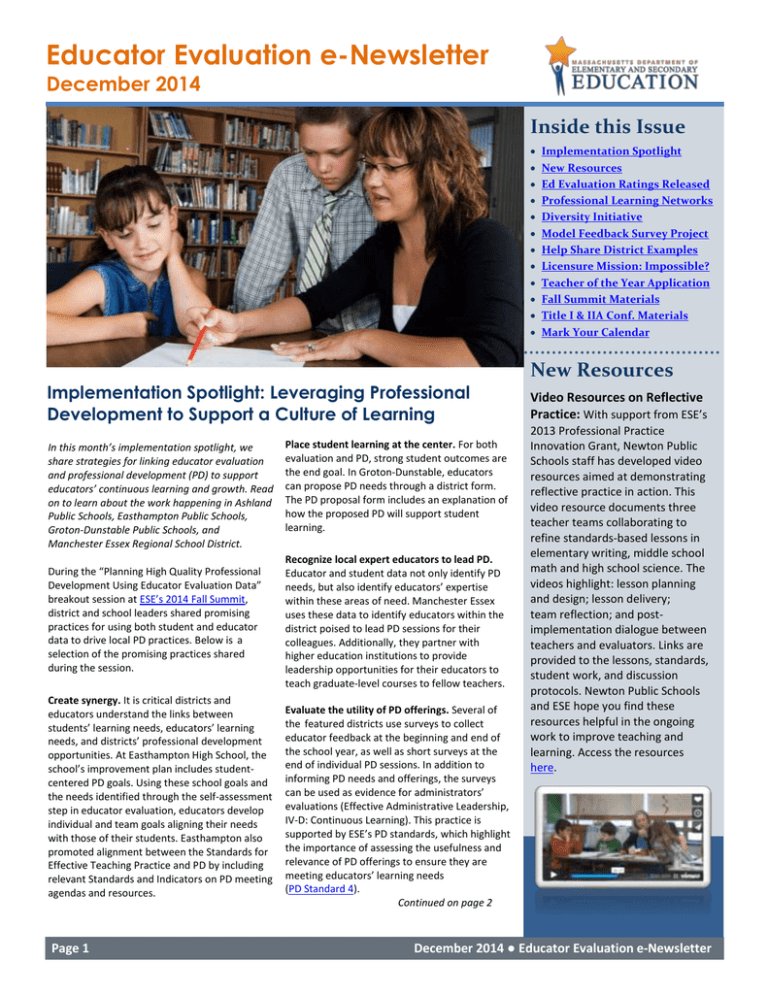
Educator Evaluation e-Newsletter December 2014 Inside this Issue Implementation Spotlight: Leveraging Professional Development to Support a Culture of Learning In this month’s implementation spotlight, we share strategies for linking educator evaluation and professional development (PD) to support educators’ continuous learning and growth. Read on to learn about the work happening in Ashland Public Schools, Easthampton Public Schools, Groton-Dunstable Public Schools, and Manchester Essex Regional School District. During the “Planning High Quality Professional Development Using Educator Evaluation Data” breakout session at ESE’s 2014 Fall Summit, district and school leaders shared promising practices for using both student and educator data to drive local PD practices. Below is a selection of the promising practices shared during the session. Create synergy. It is critical districts and educators understand the links between students’ learning needs, educators’ learning needs, and districts’ professional development opportunities. At Easthampton High School, the school’s improvement plan includes studentcentered PD goals. Using these school goals and the needs identified through the self-assessment step in educator evaluation, educators develop individual and team goals aligning their needs with those of their students. Easthampton also promoted alignment between the Standards for Effective Teaching Practice and PD by including relevant Standards and Indicators on PD meeting agendas and resources. Page 1 Place student learning at the center. For both evaluation and PD, strong student outcomes are the end goal. In Groton-Dunstable, educators can propose PD needs through a district form. The PD proposal form includes an explanation of how the proposed PD will support student learning. Recognize local expert educators to lead PD. Educator and student data not only identify PD needs, but also identify educators’ expertise within these areas of need. Manchester Essex uses these data to identify educators within the district poised to lead PD sessions for their colleagues. Additionally, they partner with higher education institutions to provide leadership opportunities for their educators to teach graduate-level courses to fellow teachers. Evaluate the utility of PD offerings. Several of the featured districts use surveys to collect educator feedback at the beginning and end of the school year, as well as short surveys at the end of individual PD sessions. In addition to informing PD needs and offerings, the surveys can be used as evidence for administrators’ evaluations (Effective Administrative Leadership, IV-D: Continuous Learning). This practice is supported by ESE’s PD standards, which highlight the importance of assessing the usefulness and relevance of PD offerings to ensure they are meeting educators’ learning needs (PD Standard 4). Continued on page 2 Implementation Spotlight New Resources Ed Evaluation Ratings Released Professional Learning Networks Diversity Initiative Model Feedback Survey Project Help Share District Examples Licensure Mission: Impossible? Teacher of the Year Application Fall Summit Materials Title I & IIA Conf. Materials Mark Your Calendar New Resources Video Resources on Reflective Practice: With support from ESE’s 2013 Professional Practice Innovation Grant, Newton Public Schools staff has developed video resources aimed at demonstrating reflective practice in action. This video resource documents three teacher teams collaborating to refine standards-based lessons in elementary writing, middle school math and high school science. The videos highlight: lesson planning and design; lesson delivery; team reflection; and postimplementation dialogue between teachers and evaluators. Links are provided to the lessons, standards, student work, and discussion protocols. Newton Public Schools and ESE hope you find these resources helpful in the ongoing work to improve teaching and learning. Access the resources here. December 2014 ● Educator Evaluation e-Newsletter Spotlight continued from page 1 ESE’s Diversity Initiative Connecting educator evaluation and PD is a learning experience. Presenters acknowledged that understanding and using data from evaluation and PD is an opportunity for district leaders to learn as well. In Ashland, for example, the district leadership team meets regularly to reflect on their achievements in meeting educators’ needs through PD as well as opportunities to further align evaluation and PD into one coherent system to support educators and students. For more information about the work happening in these districts and to access presentation materials, visit the Fall Summit Website. Educator Evaluation Ratings from 2013-14 Released Last month, ESE released the second year of educator evaluation ratings determined under the state framework. Close to 71,700 educators in 372 districts were evaluated using systems aligned to the new state framework in 2013-14. As a reminder, evaluation data is only reported in the aggregate. Individual evaluation data is considered confidential personnel information and is not subject to disclosure (for more information on data reporting and confidentiality, read the FAQs). Similar to the first year, the vast majority of teachers and administrators who were evaluated received a solid Summative Performance Rating. Statewide, 86.5 percent of educators evaluated last year were Proficient. Smaller percentages of educators received the highest performance rating of Exemplary (8.1 percent) or a rating of Needs Improvement (4.8 percent). Less than one percent of educators were rated as Unsatisfactory (0.5 percent). While the ratings represent the culmination of the evaluation cycle, they only scratch the surface of the transformational work underway in districts across the Commonwealth. As districts have developed systems aligned to the state framework many have had success prioritizing increased administrator time in classrooms, additional collaborative time for educators, and structures that support more specific, actionable and timely feedback educators can use to inform their practice. Anchored by statewide standards of effective practice, the evaluation framework has introduced common language and expectations for high performance that facilitate rich conversations about teaching and learning, supporting even the most expert educators to improve their practice. Administrators and teachers report that their new evaluation systems provide opportunities for reflection, which is critical to a process that begins with educator self-assessment and goal-setting. The 2013-14 ratings demonstrate that evaluators are able to distinguish practice across the four performance levels. They also reinforce that the vast majority of educators in Massachusetts are doing a good job. However, it is important to keep in mind they are a distillation of a multifaceted evaluation process. Intended to empower educators and support their development, evaluation represents a major investment on the part of educators and evaluators to support educator practice and student learning. Educator Effectiveness Professional Learning Networks In October, ESE launched two Professional Learning Networks (PLNs) designed to engage districts in a deep partnership with each other and with ESE around two areas of interest: developing and refining teacher leadership models and supporting evaluator capacity. Through a competitive application process, eleven districts were selected for the Teacher Leadership PLN (Diman Regional Vocational Technical, Leicester, Leominster, New Bedford, North Reading, Northampton, Old Rochester Regional, Shawsheen Valley Technical, Wakefield, and Wareham) and eight districts were selected for the PLN for Supporting Evaluator Capacity (Berkshire Hills Regional, Greater Lawrence Regional Vocational Technical, Hadley, Marblehead Community Charter, Monson, Northbridge, Union 28, and Weymouth). Continued on page 3 Page 2 ESE is committed to focusing on the recruitment and retention of a diverse and culturally proficient educator workforce. As part of this commitment, ESE launched a Diversity Initiative in 2013. The Diversity Task Force Report and ESE’s Action Plan in Response to the Diversity Task Force Recommendations are posted on our website. As we continue this important work, updates will also be posted on the website. If you know of promising or successful practices within the state that you feel should be highlighted, please contact Cynthia Mompoint at cmompoint@doe.mass.edu. Round Two Applications for the 2014-15 ESE Model Feedback Survey Administration Project Now available! Interested in using the ESE Model Feedback Surveys with your educators this year? ESE is inviting up to 10 new districts to join the 25 current districts participating in the 2014-15 ESE Model Survey Administration Project. This is an opportunity for MA schools and districts to administer the ESE Model Feedback Surveys through an online platform at no cost. ESE will not collect nor be provided access to any identifiable survey data generated through this project. Applications are accepted on a rolling basis, with the application window closing on January 16th, 2015. To learn more about the project and access the application, visit our website. Help ESE Share District Examples ESE and SRI International are seeking examples of effective educator evaluation-related practices, materials, and tools that districts have developed or adapted. Selected submissions will be shared with other MA districts to support the implementation of the Educator Evaluation Framework. Learn more about sharing your own successful practices here. The deadline for submissions is December 19th, 2014. December 2014 ● Educator Evaluation e-Newsletter . Professional Learning Networks continued from page 2 The scope of work and intended outcomes for the two groups includes: Teacher of the Year Now Accepting Nominations! Teacher Leadership PLN Learning and sharing best practices regarding designing and implementing a variety of effective teacher leadership roles, including peer coaches, peer evaluators, mentors, lead teachers, curriculum leaders, and professional development leaders. Collaborating to overcome common implementation challenges, such as finding funding; overcoming logistical challenges such as scheduling and time; collectively bargaining roles and duties; identifying and selecting teachers; supporting and developing teacher leaders. Creating a series of case studies for broad dissemination that will highlight a particular area of challenge and how a district worked to overcome it. PLN for Supporting Evaluator Capacity Piloting innovative approaches to improving educator evaluation systems according to areas of need identified by each district, including: improving evaluator calibration and efficiency; collecting and analyzing evidence; providing timely and actionable feedback; and managing and using evaluation data. Conducting cross-site visits to observe and learn from other districts. Documenting shareable resources and best practices resulting from pilots and site visits. We look forward to sharing the work that results from the two PLNs with districts statewide in the spring and hope that all districts can benefit from the resources and ideas that the two groups collectively generate. You can read more about the PLNs on our website. Licensure Mission: Impossible?! Not this time. The Challenge: In July of 2013, the Office of Educator Licensure team set its sights on a lofty goal: “Bust the Backlog” on wait times for new application processing from 34 weeks to LESS THAN TWO by October 31, 2014. The Numbers: In less than 14 months, we have reviewed a staggering 135,000 applications from current and potential Massachusetts educators, issued more than 37,350 licenses, processed over 58,600 renewals, and endorsed over 13,450 Sheltered English Immersion (SEI) teachers. The Result: MISSION: Accomplished! The Next Phase: With backlog busted and newly-gained momentum, we refuse to rest on our accomplishments. In addition to continuing our expedited turn-around time on all applications, we have set goals related to increasing customer service access, redesigning our website and online presence, streamlining documentation, and improving overall applicant guidance. We are also introducing a pilot process that prioritizes application review for much-needed shortage areas, such as moderate and severe disabilities, math, and science. Nominate one of the phenomenal teachers you know to be the 2016 Massachusetts Teacher of the Year! The Teacher of the Year is a standout teacher with a minimum of four years of teaching experience. In this role, the teacher will serve as a liaison to ESE and as an ambassador to other teachers in the state. The MA Teacher of the Year will have the opportunity to serve as a representative for the teaching profession, including public speaking and writing opportunities, the ability to provide feedback on current state policy and initiatives, and collaboration with other amazing educators. In addition to a receiving a stipend, the MA Teacher of the Year will participate in a summer workshop at ESE, become a member of ESE’s Educator Effectiveness Teacher Advisory Cabinet, travel to Washington DC to meet the President and other state teachers of the year, and will be invited to spend a week at Space Camp. Please nominate a teacher today! Nominations are due by January 31st, 2015 and completed Teacher of the Year applications are due by February 20th, 2015. To learn more about the MA Teacher of the Year program, please visit our website. The Winners: All of us. It is our hope that these improvements from the Office of Educator Licensure directly benefit all of our constituents in the months to come – educators, prospective educators, school districts, and most of all, students, who deserve a fully-licensed teacher in every classroom, every day. Page 3 December 2014 ● Educator Evaluation e-Newsletter Mark Your Calendar Focus Groups on Re-envisioning DDMs “Office Hours” December – May In response to requests from M.A.S.S. and the Superintendent Advisory Council for additional technical support in implementing DDMs, ESE will be adding four additional “office hour” sessions across the state. Dates, locations, and registration information is available online. Educator Effectiveness Spring Convening – Save the Date! ESE will host the 3rd annual Spring Convening in Marlborough on May 27th, 2015 and the program will be repeated on May 28th. Look for more information in the February newsletter. In the meantime, check out the materials from last year’s convening. ESE’s 2014 Fall Summit Materials In October, 750 educators came together in Marlborough to share their successes in implementing statewide initiatives to enhance the achievement of all MA students. Session topics included: educator evaluation, implementation of the 2011 Massachusetts Curriculum Frameworks, the transition to next generation assessments, and RETELL. You can access presentation materials here. Title I and IIA Statewide Conference Materials On November 5th, ESE hosted the Fall Title I and Title IIA Statewide Conference. Over 200 district and school staff attended workshops focused on topics ranging from Budget Planning to Professional Development. The purpose of Title IIA funding is to increase student achievement through comprehensive district supports that focus on the preparation, training, recruitment, and retention of effective educators. Materials from the conference are available online. Save the date: The Spring Title I and Title IIA Statewide Conference will take place on June 1st, 2015. Questions or Comments are always welcome at EducatorEvaluation@doe.mass.edu Contact the Educator Evaluation Team Claire Abbott, Evaluation Training Program, Implementation Support, Student and Staff Feedback Susan Berglund, Evaluation Liaison to Level 3 and Level 4 Districts Matt Holloway, Evaluation Training Program, Evaluator Capacity, Student and Staff Feedback Kat Johnston, Teacher Leadership, Communications, Implementation Support Simone Lynch, Assistant Director, Center for Educator Effectiveness Ron Noble, Educator Evaluation Manager Craig Waterman, District-Determined Measures, Evaluator Capacity The Department of Elementary and Secondary Education is committed to preparing all students for success in the world that awaits them after high school. Whether you are a student, parent, educator, community leader, taxpayer, or other stakeholder interested in education, we invite you to join us in this endeavor. We are guided by this mission... "To strengthen the Commonwealth's public education system so that every student is prepared to succeed in postsecondary education, compete in the global economy, and understand the rights and responsibilities of American citizens, and in so doing, to close all proficiency gaps." And by these goals... Strengthen curriculum, instruction, and assessment Improve educator effectiveness Turn around the lowest performing districts and schools Use data and technology to support student performance To receive the monthly Educator Evaluation e-Newsletter in your inbox, please subscribe at http://www.surveygizmo.com/s3/1475008/EducatorEvaluation-e-Newsletter-Sign-Up. Page 4 Page 3 December 2014 ● Educator Evaluation e-Newsletter

